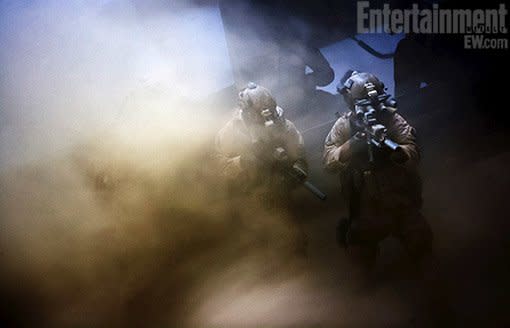New documents explain Pentagon, CIA cooperation on 'Zero Dark Thirty'

Photo: Jonathan Olley.[/caption]
It turns out the CIA and Pentagon officials were just big fans of The Hurt Locker.
New documents pertaining to government and military cooperation on the Osama bin Laden takedown film Zero Dark Thirty (out Dec. 19) were posted Tuesday evening by the conservative watchdog group Judicial Watch, but they fail to confirm the organization’s theory that director Kathryn Bigelow and producer-screenwriter Mark Boal were given special access for the sake of political gains.
In fact, media relations officials discussed the need to be fair to others who were seeking similar information about the May 2, 2011 raid — and they told each other one reason to speak to Boal and Bigelow was for the sake of learning more about the project themselves.
Nowhere in the documents does any representative of the CIA or Department of Defense ever express interest in the project for propaganda purposes. Rather, they talk about the respect they have for Bigelow and Boal’s Oscar-winning Iraq War drama The Hurt Locker, as well as their work for charities aiding military families.
In their requests for access, Boal and Bigelow also revealed the secret working title of the film — For God and Country.
All of the documents are available here, along with Judicial Watch’s continued insistence that “the Obama administration granted Boal and Bigelow unusual access to agency information in preparation for their film.”
Boal and Bigelow did not respond to request for comment.
In a June 7, 2011, exchange with Defense Department spokesman George E. Little, CIA spokesperson Marie Harf indicated that the agency had received requests from Imagine Entertainment and director Ron Howard for help on a possible bin Laden project, but indicated the Boal/Bigelow film was more worthy of the access due to their pedigree and the likelihood it would actually happen:
undefined
Little responds by advocating for broader access in general, if only for the sake of making contacts with Howard’s talent agency CAA:
undefined
On June 15, 2011, Assistant Secretary of Defense for Public Affairs Douglas Wilson sent this email to Benjamin Rhodes, Deputy National Security Advisor for Strategic Communications, saying how well-regarded The Hurt Locker was and identifying one of the military charities Bigelow has helped, CIA director Leon Panetta was, apparently, eager to assist the film:
undefined
Wilson also indicates a desire to learn more about the limits on information that could be shared with the filmmakers, as well as others looking to dramatize the raid.
undefined
Deputy White House Press Secretary Jamie Smith responded in an email that indicated the military and intelligence communities were assisting the film well before the White House got involved.
undefined
This would seemingly undermine the claim by Judicial Watch and Congressman Pete King* (R-NY)that President Obama was helping the filmmakers to remind voters of his role in authorizing the raid on bin Laden’s compound. (In his first interview about the film, Boal told EW that Obama was not even depicted in the movie, which focuses instead on the behind-the-scenes teams who hunted down the terrorist.)
On June 15 2011, the DoD’s Little wrote to DoD’s Wilson:
undefined
That same day, Mark Boal wrote to DoD’s Wilson and Philip Strub, entertainment media liaison for the Department of Defense, to coordinate a meeting, indicating he had already done a lot of research and would like to consult with the department:
undefined
Rhodes wrote to Wilson, Little, and Smith that one reason to meet with the filmmakers would be to learn more about what Boal was working on.
undefined
On July 14, 2011, Boal’s assistant, Jonathan Leven, emailed the CIA’s Harf to ask if open-source floor plans they’d acquired for what was said to be bin Laden’s compound were indeed accurate. Harf replied:
undefined
Boal wrote to Harf, asking for more details, such as wall height:
undefined
Harf joked:
undefined
Judicial Watch included the schematics in their document dump.
There were a handful of revelations in the collection of emails. One of them was that Boal apparently met with a translator who accompanied the SEAL Team Six on the raid. (And once again, there was some Hurt Locker fandom going on.)
Per CIA spokesperson Harf:
undefined
The most shocking disclosure of secret information revealed in the documents was an email in which New York Times national security writer Mark Mazzetti leaked the contents of columnist Maureen Dowd’s column about the bin Laden film to the CIA’s Harf, what can only be described as a shocking betrayal to a fellow journalist:
In an Aug. 5, 2011, email, he wrote:
undefined
Mazzetti also wrote to Harf that the column would say:
undefined
Harf responded:
undefined
When Boal was asked in his EW interview about Zero Dark Thirty if he had an interview with President Obama, he laughed — somewhat irritated — and said “Next.”
After the disclosure of these documents, it’s likely to be a question he is asked again.
For more film news
Follow @breznican
* CORRECTION: An earlier version of this story misstated the congressman’s first name as Steve. Rep. Steve King is a Republican congressman from Iowa.
Read More:
Kathryn Bigelow’s Osama bin Laden pic sparks pentagon inquiry
Defense Secretary Panetta: Filmmakers provided no unauthorized info for bin Laden movie
Jessica Chastain to co-star in Osama bin Laden takedown film

